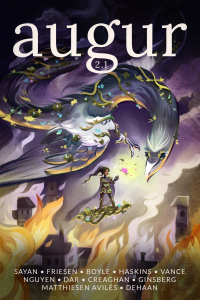Russell Letson Reviews Defiance by C.J. Cherryh & Jane S. Fancher
 Defiance, C.J. Cherryh & Jane S. Fancher (DAW 978-0-75641-590-7, $28.00, 368 pp, hc) October 2023. Cover by Todd Lockwood.
Defiance, C.J. Cherryh & Jane S. Fancher (DAW 978-0-75641-590-7, $28.00, 368 pp, hc) October 2023. Cover by Todd Lockwood.
Defiance is the 22nd volume in the long-running, mostly contiguous series that began in 1994 with Foreigner, the book that gave the sequence its name. And with this volume, the byline now adds Jane S. Fancher’s name to C.J. Cherryh’s, since, as Cherryh writes in a page of acknowledgments, ‘‘it seems only just that she share credit in this series… in which she has definitely had a hand and written many scenes.’’ I think I see other changes that have been developing over the last few entries, but the book (like this review), has a number of setup tasks on the way to getting to the heart of the story.
First, there is the usual basic orientation: how a population of lost humans came to live on an island on a world occupied by the deceptively-human-seeming atevi; the unique status that the human Bren Cameron has among these folk; and why his job as paihdi (translator-diplomat-intermediary-troubleshooter) is so delicate and difficult. Then there is a whole body of information about the current status of that delicate and difficult role, particularly a considerable volume of atevi historical-geopolitical material that is behind the plans of the very old and rather frail but relentlessly active dowager Ilisidi (grandmother of the current atevi aiji – overlord – Tabini, and herself a former aiji), who has been pursuing several long-game projects that can knit together contending regions and interest groups while stamping out the remnants of the lawless and destructive Shadow Guild cabal that caused much havoc in earlier volumes.
Defiance opens a new three-book arc, though unresolved issues and political problems from the previous trio (Emergence, Resurgence, and Divergence) continue to complicate the lives of Cameron and his atevi staff. Cameron’s and Ilisidi’s entourages, along with Assassins’ Guild personnel and some new and uncertain possible allies, are on an ‘‘interminable train ride,’’ with a perhaps-unwell Ilisidi isolating herself behind her own staff. Cut off from communication with the outside world and uncertain of what Ilisidi’s plans are, Cameron spends much of the opening chapters reviewing possible scenarios and sorting through his understanding of atevi history and geopolitics – partly via a book about Ilisidi’s earlier exploits. (A chapter of that book, The Dual Regencies of Ilisidi of Malguri, is supplied as an appendix to the novel.).
Cameron’s reflections and research also supply us readers with more background, building an expanded picture of atevi political forces and rivalries, and of the diversity of atevi social arrangements beyond the Renaissance-Italy/medieval-Japan atmospherics with which long-time readers have become familiar. Here, at last, is a detailed picture of a variety of governing structures and styles, conditioned by geography and history and economic necessity, by migrations and displacements and competition for resources, by old resentments and ethnic rivalries and feuds. The atevi sociopolitical world is not uniform throughout, like processed cheese, but heterogeneous and challenging.
For example, the Edi people who now live on Cameron’s estate were displaced from their own island territory to make room for a human-only settlement, and while their psychology is clearly atevi, their social life is configured quite differently: not a feudal-like lords-estates-and-cities arrangement, but something more rural, less settled, not at all technology-friendly, and a matriarchy to boot, with a Grandmother at the top of the pyramid. Which makes for a nice meeting when the dowager needs to work some things out with her Edi rough equivalent.
The Grandmother was accustomed to laying down pronouncements and expecting results – so was the dowager inclined, extremely so, to do the same. Yet they had talked at length, two old women looking down a long history of problems, and they had agreed – on something.
But there remain familiar motifs. Cameron’s uncertainties are a version of a perennial series feature: he is often off-balance, worrying whether he is analyzing atevi motives and actions adequately. Despite their appearance (very tall, ebony-skinned, golden-eyed, like very tall, ebony-skinned, golden-eyed Earth people), their familiar-seeming sociocultural structures (clans, guilds, classes, cities, trade, hierarchical governing systems), atevi emotional and relational structures do not map onto human emotions and relationships in more than roughly analogical ways. So despite long study and acquaintance – even to the point of maintaining what looks like an affectional relationship with one of his bodyguard/staff – Cameron often finds himself groping for an understanding of how a given stressful situation will break, where the crucial connections lie, and what their roots might be.
Other motifs that have been developing for a while in the series continue to elaborate. The atevi boy Cajeiri, now nearly ten years old and the officially designated heir to the office of aiji, starts to exert control of his own household staff and dips his young toe into the grown-up world of seriously considered independent action, as distinct from the impulsive adventure-seeking of earlier books. In addition to his unique position as the only atevi viewpoint character, he is also an indication of how close contact with Others might affect an atevi personality.
He had… traveled on the starship farther than even humans could imagine. He had talked with the [alien] kyo, who were much stranger than humans, and he had understood them, well, as much as anyone did. He knew them by name, and they knew his…. He had done all those things…. most importantly, he had gained human associates.
As remarkable as Cajeiri’s growing psychological-cultural flexibility is, there have already been hints from the adults with whom Cameron has formed atevi-like ties of associational loyalty – man’chi. At the series beginning, Tabini settled on a very green Cameron as a kind of ally in his programs of technological transformation of his world. And the thoroughly traditional but pragmatic Ilisidi understands and depends on Cameron’s character (and man’chi) well enough to manipulate him. Then there are the adventurous, technophilic Lord Geigi, who now lives full-time on an orbital station; the crusty, conventionally xenophobic Lord Tatiseigi, who discovered a soft spot for human youngsters; the dashing young Lord Reijiri, whose yellow biplane dominates the book’s cover; and of course the never-closely-examined relationship with bodyguard/lover Jago.
All this elaboration and deepening of the series’ world is woven into a familiarly gradual buildup to a decidedly physical set of actions. The location of fugitive but still deadly vicious Shadow Guild elements is determined; forces are set moving; missions are planned and executed; villains are confronted and dealt with. Perhaps the most striking part of Cameron’s adventures are his flights in Reijiri’s biplane, including a lovely description of flying in a light, open-cockpit aircraft for the first time – by someone who has star-traveled. It was
never quite like this. Not even airliners or shuttles…. He closed his eyes then, letting his body rule his sense of direction… and his heartbeat went wild. He was in the wind. A part of it. There was a texture, a solidity to it, little bumps and sways, eddies and flows that a jet never reacted to. And down settled finally in a normal direction, with sky in front of him.
This volume feels more like the real completion of the previous arc trio, with as much resolution of the Shadow Guild problem as could be expected in such a realistically messy world. It does, however, prepare for a new set of challenges, particularly for Cajeiri in his deepening relationships with humankind and the promise of his future as a leader. For all the intrigues and chases and escapes and derring-do, it is these internal transformations and their effects on relationships among individuals and peoples that keep the Foreigner series fresh and compelling after so many years and so many volumes.
Russell Letson, Contributing Editor, is a not-quite-retired freelance writer living in St. Cloud MN. He has been loitering around the SF world since childhood and been writing about it since his long-ago grad school days. In between, he published a good bit of business-technology and music journalism. He is still working on a book about Hawaiian slack key guitar.
This review and more like it in the November 2023 issue of Locus.
 While you are here, please take a moment to support Locus with a one-time or recurring donation. We rely on reader donations to keep the magazine and site going, and would like to keep the site paywall free, but WE NEED YOUR FINANCIAL SUPPORT to continue quality coverage of the science fiction and fantasy field.
While you are here, please take a moment to support Locus with a one-time or recurring donation. We rely on reader donations to keep the magazine and site going, and would like to keep the site paywall free, but WE NEED YOUR FINANCIAL SUPPORT to continue quality coverage of the science fiction and fantasy field.
©Locus Magazine. Copyrighted material may not be republished without permission of LSFF.








